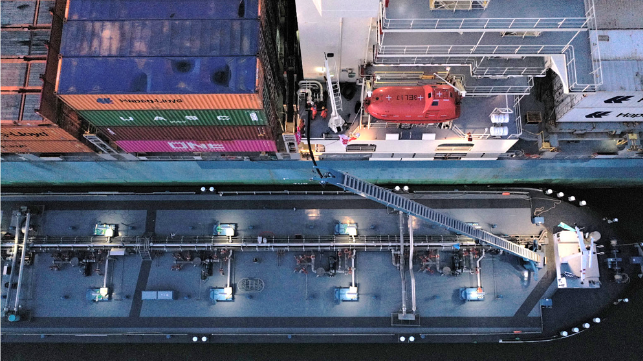ONE Returns for More Biofuel After Successful Trial

Ocean Network Express (ONE) has completed a second trial of sustainable marine biofuel onboard the containership MOL Experience, this time with a much smaller proportion of petroleum fuel oil in the mix.
In this trial, the mixing ratio was three times higher in biofuel content. MOL Experience filled some of her tanks with marine biofuel during bunkering at the Port of Rotterdam on March 7. The vessel, deployed on ONE’s AL5 service, consumed the biofuel within 24 days.
As in the first trial, the Dutch biofuel bunkers provider GoodFuels was the supplier of the stem. GoodFuels’ product has been used by UECC, CMA CGM, Norden, Stolt Tankers and Eastern Pacific, among others. The advanced biofuel used in the trial is produced from certified feedstocks labeled as 100 percent waste or residue, such as used cooking oil.
Biofuels are considered to be carbon-neutral if the carbon dioxide absorbed by the source of the biomass is equal to the carbon dioxide released when the fuel is burned. Depending upon the feedstock, they have the potential to be an environmentally-friendly alternative to fossil fuels. GoodFuels’ products deliver about 80 to 90 percent well-to-wake CO2 emissions reductions when compared to standard bunker fuels, but they are technically and operationally equivalent. No modifications of the engine, piping, tanks, bunker barges or fuel supply infrastructure is required.
GoodFuels says that it only works with renewable feedstocks that can’t be used for any higher quality application or recycling, and are therefore considered legitimately sustainable. This is a significant consideration: other biofuels derived from food and from purpose-grown, non-food crops can have significant land use, soil quality and GHG emissions impacts.

that matters most
Get the latest maritime news delivered to your inbox daily.
ONE says that the use of biofuels will help address its environmental sustainability targets, which include a plan to reduce carbon dioxide emissions intensity (per TEU-mile) by 50 percent by 2050.
“The second trial was a big challenge for us because of the higher content ratio of biofuel. We are really happy to have completed the trial without any problem. I would like to express my sincere thanks to MOL, GoodFuels and related parties for their collaboration and effort. We will continue to study biofuel usage for ONE’s fleet, as we have the ambition to use biofuels in high ratio and large quantities to decarbonize our fleet,” said Takashi Mishima, general manager of fleet management at ONE.
